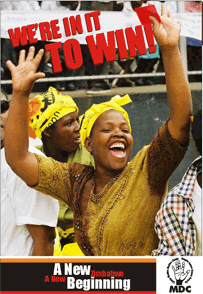ABOUT THE MOVEMENT FOR DEMOCRATIC CHANGE! (WITH SPECIAL REFERENCE TO THE ATROCITIES PERPETRATED BY ZANU-PF AND THE STATE MACHINERY AGAINST THEM!)

Custom Search
skype chat
What exactly is the way forward in Zimbabwe?? Please Zimbos lets discuss! hosted by zimfinalpush.
Chat about what's on your mind. More about public chats.
|

Powered byIP2Location.com
NB: THIS IS NOT THE HOME PAGE!
"SURE, WE ARE IN IT TO WIN!"

"A NEW ZIMBABWE, A NEW BEGINNING!"
About Me
Blog Archive
Monday, December 17, 2007
Land reform: How the looting on farms began
Sundayview by Judith Todd
LINK!!!
TRYING to find out what happened to land bought by government for resettlement with donor funds that had come mainly from Britain, Chief Minister Joshua Nkomo travelled the country in August and September 1988.
It was said that, of the funds provided, Zimbabwe had spent 47 million pounds by 1985, with which well over three million hectares had been purchased, and that three million pounds that had not been spent had been returned by a largely disinterested Zimbabwe government to Britain.
President Mugabe and colleagues had other matters on their minds and weren’t wasting much time or thought on the ownership or use of land by their fellow citizens. I knew this at first hand. My father’s Hokonui Ranch, well watered and bordering crowded communal lands, had been offered twice to government for acquisition, but no one was interested.
Before Nkomo left Harare, he assembled information on farms acquired. Just before he arrived in Matabeleland South, Governor Mark Dube and the head of the provincial police force based in Gwanda went on unscheduled leave. That was a dramatic illustration of how little they respected the status of the chief minister in the president’s office and with what contempt they viewed the unity accord. In their absence, Nkomo was attended to by the provincial administrator.
When they met in Gwanda, Nkomo asked the provincial administrator how many farms government had acquired in Matabeleland South. The PA was obviously ill at ease and flustered, but said he thought there were fifteen. "Really," said Nkomo, taking a list of farms from his pocket. "This is very interesting, because the people in Harare think there are sixty-four. So let’s just visit all the names on this list and see what the true situation is."
On the second day of touring, the PA begged to be excused from accompanying Nkomo as, he said, he was beginning to feel very sick. Flu or something. Nkomo assured him that he would undoubtedly start feeling better as the day wore on and did not excuse him. The PA had already admitted that he had been instructed by Governor Mark Dube to tell Nkomo that the government had bought only 15 farms in the province.
As they travelled from farm to farm, the workers assembled, so happy to meet Nkomo, who chatted easily to them, admiring the beautiful cattle and the wonderful farm. So when he asked to whom it belonged, they freely said, "Governor Dube," or whoever the chef in possession of the land was.
"How many cattle on this farm?"
"One thousand," or however many there were.
"And to whom do they belong?"
"Governor Dube," or whoever the chef was.
But there were not only cattle on these farms. There were government tractors, trucks from the District Development Fund, and where did all these cattle come from?
One of the farms turned out to "belong" to the indisposed provincial administrator.
When Nkomo reported his findings on Matabeleland South, President Mugabe gave the impression of being stunned. Only one word could describe what had been going on, and that word was looting. Now we could begin to understand why people like Governor Dube were at all stages trying to sabotage the return of the dissidents to society. Their disruptive presence in the bush was a wonderful cover for the grabbing of land, animals and equipment and an excuse not to resettle the landless people for whom it was claimed the farms had been acquired.
Despite Nyagumbo and others who hated Nkomo, the integration of PF Zapu and Zanu PF seemed to be going quite well. One of the people being particularly friendly post-unity was Deputy Minister Amina Hughes.
Just before the 70th birthday in July of Senator Joe Culverwell, the Deputy Minister for Education, she told me that she had got hold of some fake rhino horn powder as his birthday present. Rhino horn is reputedly a powerful aphrodisiac, hence the plight of the rhinos.
I went to a small American embassy party in honour of the new head of the US Information Services, who was originally a Palestinian . . . Senator Culverwell was a fellow guest at the party, and we were on the balcony watching the most glorious sunset. It was the sort of evening that, depending on your circumstances, could inspire thoughts of rhino horn.
So Joe told me of this wonderful gift that Amina had given him. He said: "So many people want it! Comrade Marere (a fellow deputy minister) has offered me Z$10 for just a little pinch!" Of course, I didn’t tell him that I knew about it and that it was fake. I just said I wondered how Amina could have got hold of it. Could it have been from Mrs Victoria Chitepo, Minister for Tourism and Natural Resources? Joe looked horrified?
Two prominent members of the former PF Zapu were named as envoys, more fruits of unity. Isaac Nyathi, who was detained with Masuku and Dabengwa after Nitram was banned, became the new high commissioner to Nigeria and Ghana. Arthur Chadzingwa was the ambassador to Algeria. Arthur was someone loved by people in all groups. He was a candidate for PF Zapu in the 1980 elections, but was prevented from campaigning in his home area of Manicaland by members of Zanla. At least they said: "Sorry, Arthur" and didn’t visit violence upon him.
During the time of the Pearce Commission, when thousands of people were locked up by the Smith regime, Arthur was for some time held in a cell with Charlton C Ngcebetsha. He helped the time pass by teaching Arthur cricket in a cell with no ball and no bat. Arthur said he got pretty good at shouting HOWZAT! Arthur also told me that Ngcebetsha had lamented the fact that most great men like Winston Churchill and Garfield Todd had disappointing children.
Charlton Cezani Ngcebetsha was born in the Transkei in 1909, and moved north to Ntabazinduna, outside Bulawayo, as a missionary for the Presbyterian Church. He became heavily involved in education, business, politics and the press, and was close to Joshua Nkomo. He founded the African Home News in 1953, which was closed in 1965 when he was detained in Gonakudzingwa. Charlton Ngcebetsha was quite irrepressible, and somehow, within a short time of his detention, the first edition of Gonakudzingwa Home News hit the streets of Bulawayo . . .
Shadreck B Gutto, the Kenyan academic, was "requested" to leave Zimbabwe, where he had been teaching at the university. He was given 48 hours to clear out and went to Norway. Paul Themba Nyathi, our director, returned from leave in Zambia, where he had bumped into some representatives of a group of 300 exiles who were still too scared to return to Zimbabwe.
Eleven of their number had gone home the previous September and promised to write to their comrades to tell them what life was like. As the people in Zambia hadn’t heard a word from them, they assumed they were either locked up in Stops Camp, or dead. So the safe return of these 300 would probably be a task for us in the New Year. We hadn’t yet finished coping with the former dissidents. Forty-three of them were doing very well in the new co-operative in the Nkayi area, but the rest still had to establish themselves.
Excerpt from Judith Todd’s latest book, Through the Darkness; A Life in Zimbabwe, available from www.zebrapress.co.za.
Subscribe to:
Posts (Atom)

